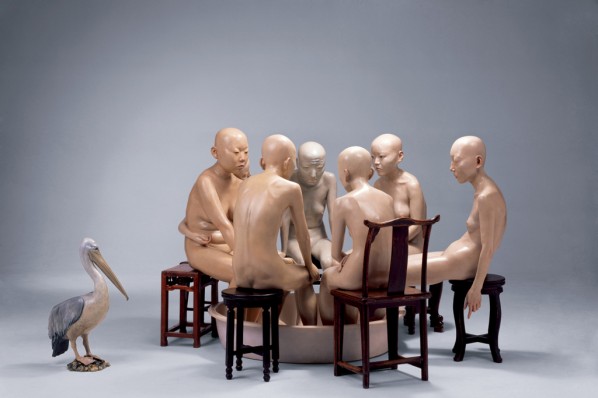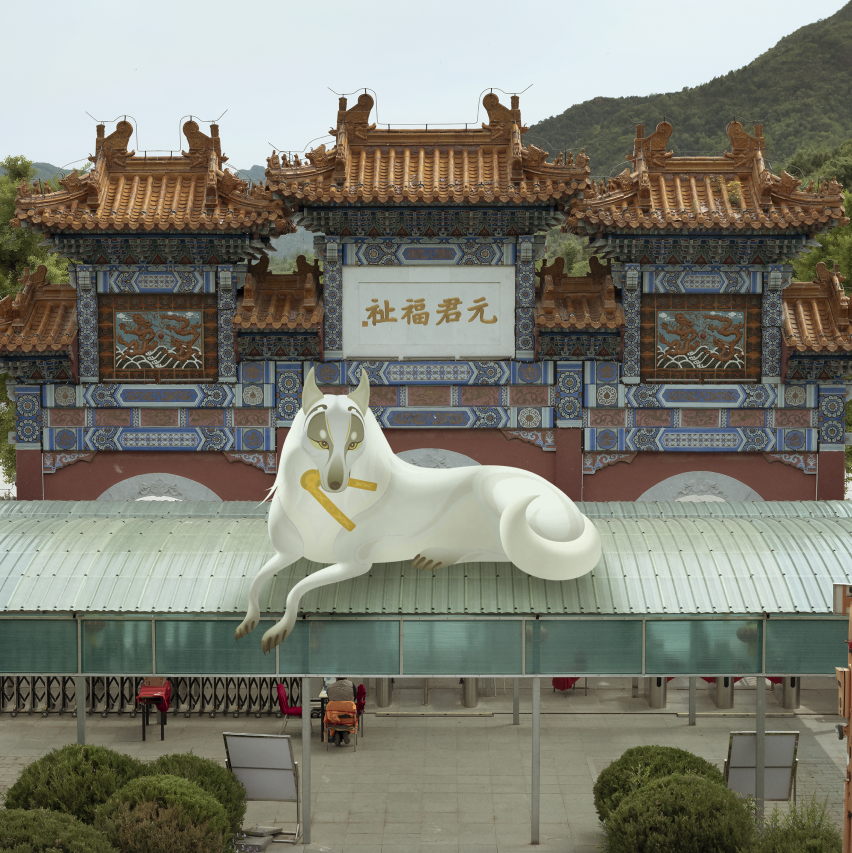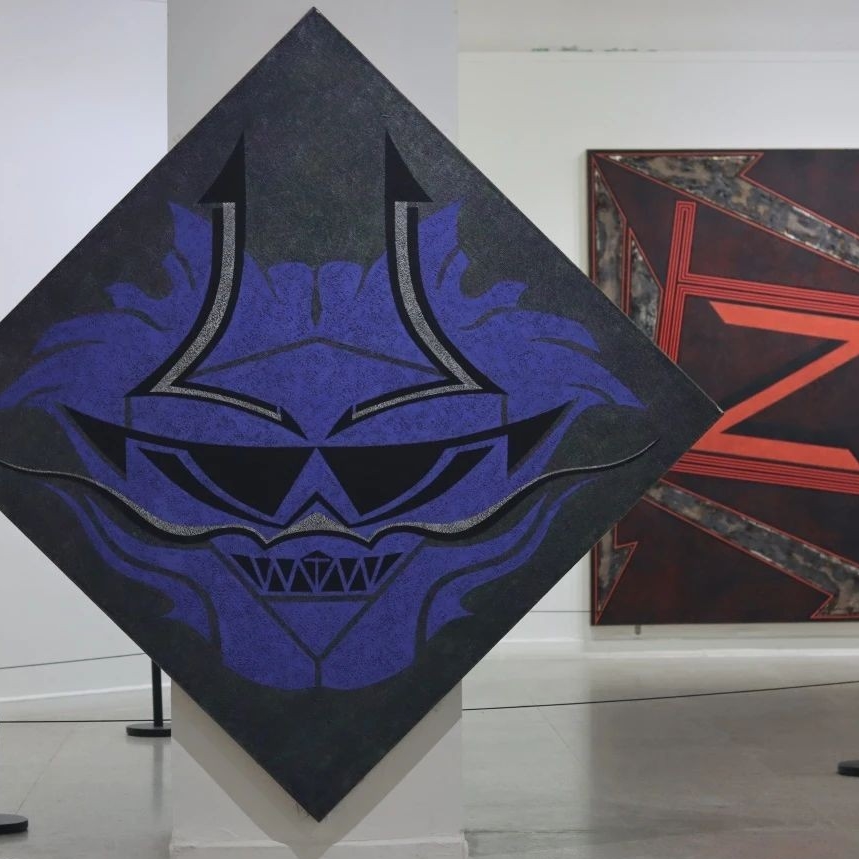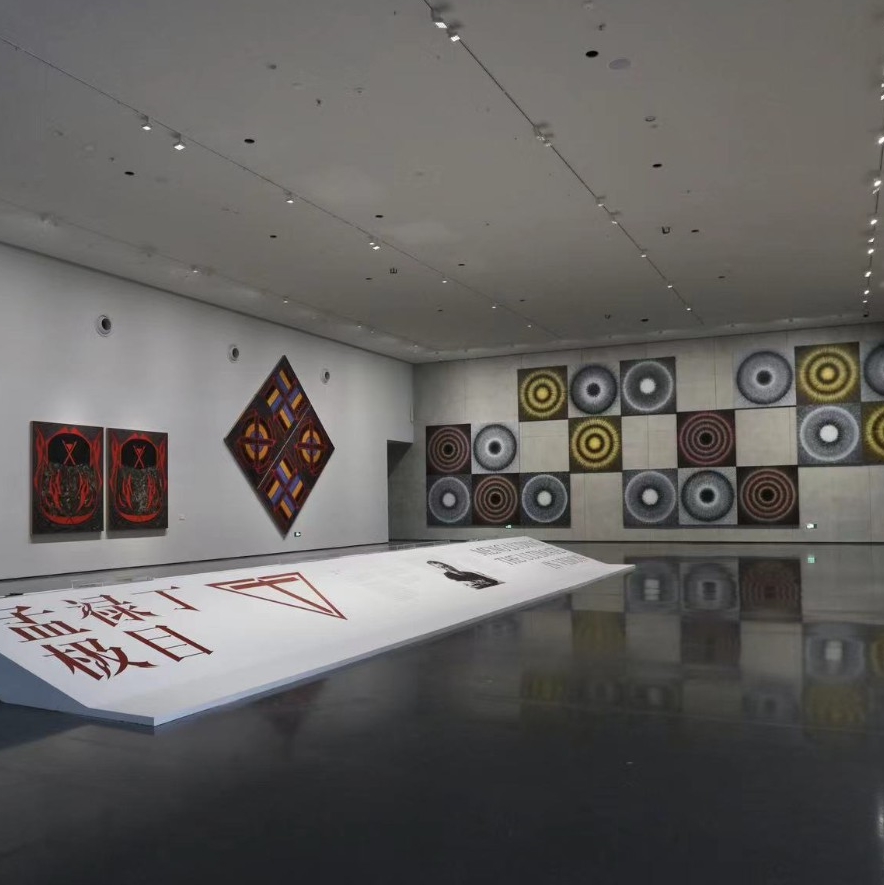
Xiang Jing: Are A Hundred Playing You Or Only One, 2007; Fibre-glass, painted, 140x240x240cm
Part III: Monumental Methods
Chen: It seems that we no longer use those monumental methods to perceive the achievements of an individual. Instead, we look for the traces they leave behind. When a pop star becomes famous, everyone sings his songs for a while, and then a few years later he leaves just a trace. That monumental way of viewing world history and individuals is gone. It seems we no longer use this way to look at the world. Of course, this is just a perspective, and there are many more perspectives. It’s like you said in your letter, how you can’t ignore disadvantaged groups and social inequailty. I’m like that too, as are many other people. This is a real problem. I think that people like Michelangelo, though I haven’t researched it, I think that in principle they weren’t bothered by such things. Their eyes were more focused on god, the great artworks of history, the tastes of the Medici family, or other things. They could live purely in this lofty world of art, but contemporary people can’t be like that. All of our education, the world we live in, all of it over the past two or three hundred years has come to focus more on the masses and issues of social responsibility. I would guess that if you asked artists of the Renaissance about these issues, they would feel it had nothing to do with them.
Xiang: Mr. Chen, I want to return to an highly individualized experience, something that may be related to what you are saying. The changes in China were very short and quick, taking place over just the last few decades. People my age were probably the last ones to catch the tail end of the elitist educational approach. I’m not very clear about this, but I have this notion. I went to the High School attached to the Central Academy of Fine Arts (CAFA) in 1984. At the time, very few people could go to that High School; it was a highly elitist educational approach but I wasn’t aware of it then. There was a high ratio of teachers to students, and we were all in this small building right next to the National Art Museum, and overlooking Longfusi Commercial Street – private businesses and small merchants were just starting to pop up. We could hear them playing the songs of Zhang Qiang and Zhang Xing every day. The wall of our compound divided two completely different worlds. We were up there painting and taking classes right next to that street. We spent every day immersed in the library, and our education was driven by a kind of infatuation with classicalism. At the time I felt that I couldn’t accept the mass culture, and I had to maintain a distance from it. And though I didn’t have any notion of the term “mass culture” back then, I still detested it and rejected it, and had to be wary and keep my distance. At the time, I was constantly aware that I was part of a rare few. But in later education, this awareness virtually disappeared. Not only did the students lose this awareness, the entire education lacked this mentality and training. You were no longer part of the few. Today’s kids grow up entirely in a mass culture environment. Do you think this notion is connected at all to democracy?
Chen: I think it is connected.
Xiang: After that, we slowly entered into a flat world.
Chen: This is an interesting topic, there’s a lot to be said about it. There is a young female scholar at Tsinghua University by the name of Liu Yu. She’s one of the hottest writers in political science, with a lot of magazines clambering to her to ask her to write columns. Her influence on the Internet is even greater than that of her column. She is a bit over thirty, with a very open mind. She has lived abroad for a long time, and is a very outstanding young woman. A few of us were chatting one day, and I was talking about how many things had been lost. She didn’t quite agree. She said, “Mr. Chen, you’re talking in comparison to old society. Today’s society is more equal, with all of the lofty things being pulled down. Why don’t you think about how, through this equality, our overall level has been raised?” This topic popped up a bit late that day, so we didn’t go too deeply into it. She and I just laid out each one’s different viewpoint. Now that you’ve brought it up. It’s not about who is right or who is wrong. There’s a lot to discuss in that. In part, it’s about the relationship between the many and the few. Sometimes it’s not about one being lower or another being lifted up, The few are the few; they will always be the few, no matter how high or low they are, it is this feeling, this state of existence, that of the few.
The notion of the elite was mainly significant in the 80s. The term is still being used now, but as I understand it, it has come to mean successful people. There are common threads between elite and successful people, but they are also quite different. The relationship between the two is something worth pondering. On the extreme side, the elite are the elite, and it has nothing to do with success, but that’s not really the case. There are some very strange paths through them, which are connected to success. We were just talking about Ding Fang. As I see it, Ding Fang is a top-level elite, but he is certainly not successful in the current painting scene. There is a problem here. I’m not saying that you must follow the changes of the times, but on the other hand, what am I persevering for? I could say that what I persevere for is what I think is good, and it has nothing to do with the times or anything else. If you say that what you persevere in is good and that only by my persevering in it can you achieve. It can subsist to the end to show to people that it is really good then we’re back at the problem of whether or not it will after all be accepted. If the people eventually come round to your way of thinking, then you are clearly connected to success. After all, you cannot use failure to educate people. You start out thinking that what you have is good, but you are very lonely, and you are still waiting for success.
I’ll raise another somewhat connected example, that of faith. Ascetic monks don’t care what is going on with people. They have a direct relationship with god and faith, and they take the ascetic path. But sometimes people are inspired, and word spreads, and the monk is venerated for his great virtue. There was a monk in the Middle Ages named Anthony. He ran off to the deserts of Egypt, as far away from civilization as possible, to engage in contemplation, but he was too famous, and a lot of people followed him out there. He wanted to be all alone, but he couldn’t. Later, it became a tradition, the tradition of solitary contemplation, and it lasted until the 20th century. You must remove yourself from the world and meditate, but then you become a great monk. Once the virtues of the great monk are established, then people come to donate money and create golden idols. Even though Buddhism renounces the world, the most influential temples are full of gold-plated bodhisattvas, pure gold bodhisattvas, gold-plated shrines and the like. These famous temples attract more people to burn incense offerings, and in this way, this world-renouncing spirit becomes intertwined with vulgar society. On the one hand, this lofty, sublime stuff is accepted by the world, elevating the world in a sense, but on the other hand, the world is for the most part using its own standards to define what is good and what is high.
Xiang: From an individual perspective, I think it comes in two parts. He is an individual, someone cultivating himself for his faith. His self-cultivation leads to a harvest for himself, and after reaping this harvest, it goes on to influence the world. As for this part, I don’t think it can be fully restored for the individual who engages in self-cultivation, or at least it’s more complicated than that.
Chen: Right. It is more complicated, with a lot more levels. I can actually lead this into my own world. I have a friend named Zou Jingzhi who is very talented and dedicated. He is a great person, and he is also a successful person. His dramas have been performed at the National Center for the Performing Arts. I have another friend named Ah-Jian, who is a famous marginal figure. We were all the best of friends, and we all had ideals. Massive changes took place in society in the 1990s, and how did we deal with them? Someone asked us to write television screenplays. Zou Jingzhi accepted, and Ah-Jian didn’t. TV series are of course a bit vulgar, but there are good and bad ones. Zou Jingzhi didn’t just write TV series, he went on to write plays, movies and musicals, becoming extremely successful. Some of his works are outstanding, such as I Love Peach Blossoms. Ah-Jian has disdained this success. With success, it is hard to avoid vulgarity. I’d even venture to say that Ah-Jian has stuck to the path of anti-success. For him, whoever succeeded was finished. In the end, in later years, the two of them drifted apart. For me, standing in the middle, I lean a little more towards Zou Jingzhi. I’m on better personal terms with Ah-Jian, because he has nothing to do, while Zou Jingzhi and I are both busy, and rarely have a chance to see each other.
The reason I said I lean towards Zou Jingzhi is because he actually went out and produced these artworks. Did he compromise his art for his audience? There is a distinction here, the one between accommodating an era and engaging in dialogue with an era. How do we distinguish the two? You need to look at each artwork. Zou Jingzhi presented his artworks, and they are very good artworks for our contemporary era.
Was there ever an era where even when you produced a relatively good work, it wasn’t very good? If that were the case, would all creative efforts be futile, to the point that I’d rather not do anything at all? Of course, Ah-Jian writes, mostly poetry. Some of his poems are quite outstanding, and he is influential in poetry circles. If we are to idealize Ah-Jian, we could say that he doesn’t care what everyone else is chatting about, that he persists in his own things, things that he can determine. If you think that I’m good, then you should follow me, because I make no compromises. But the real situation is much more complicated. If you’re really Anthony, that’s okay, but you still live in this mortal world. Perseverance is a very concrete process. Perhaps in the end it is not that you hold on to your original ideals, but rather you give up any obligation of yourself. That is because success is not only an external thing. It is also a restraint, something that must be ascertained within the artwork. You must strive in your work, constantly pushing yourself to respond to the issues of society, and constantly reshaping yourself through this interaction, creating outstanding artworks marked by your own unique traits within this constantly changing world. If you say that you don’t care about what’s going on in reality, then you have dropped your own restraints, letting yourself go.
About the author
Chen Jiaying was born in Shanghai in 1952. He entered into the Western Languages and Literature Department of Peking University in 1977, studying German, and began studying in the United States in November 1983. He received his doctorate in 1990 with his thesis Name, Meaning and Meaningfuless and then went to work in Europe. He currently teaches philosophy as a Professor at Capital Normal University in Beijing. His works include Introduction to the Philosophy of Heidegger, Philosophy of Language, The Irreducible Eidos, Philosophy Science, Common Sense, Zephyr, Beginning with Sense and Dianoesis; his translations include Philosophical Investigations, Being and Time, Linguistics in Philosophy and Sense and Sensibility among others. He is considered to be one of the most influential philosophers of the contemporary age.
Courtesy of Xiang Jing and Chen Jiajing.
The views expressed in this column are the author’s own and do not represent those of CAFA ART INFO.




























